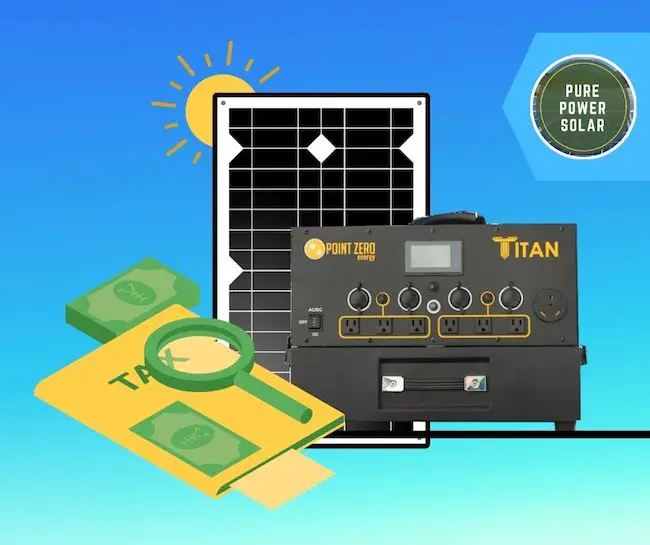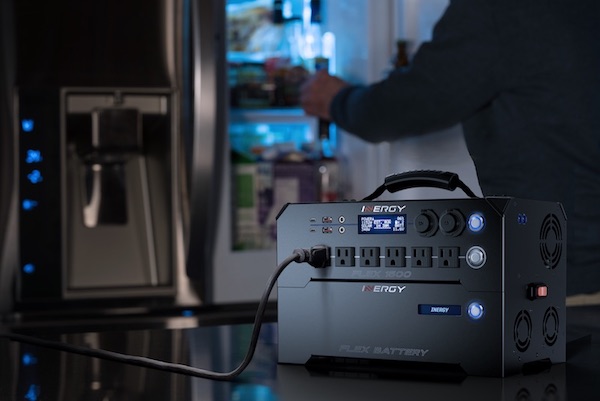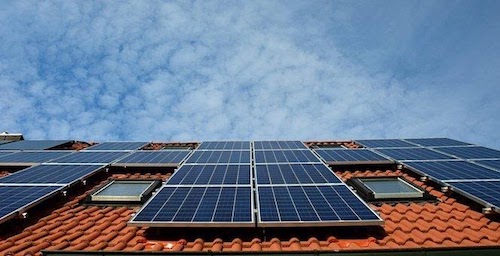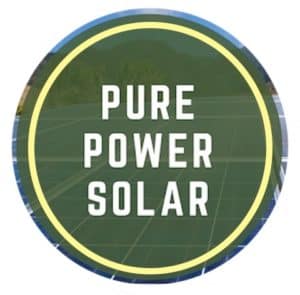Solar generators are becoming increasingly popular with residential and commercial property owners who live in areas with an unstable power grid.
Since cost is always a concern, you might be wondering if you can receive a tax deduction when you buy a solar generator.
Purchasing a solar generator (power station and solar panels) does qualify you for a federal tax credit. You’ll receive a 26% tax credit if your system is installed before the end of 2022 (22% credit if installed in 2023). This applies to the total cost of your system (including contracted labor).
A question that I was pondering when reviewing the documentation from energy.gov was if you needed to connect your solar generator system to the utility grid in order to get the tax credit.
I found that you do not need to have your system connected to your utility. In other words, you can install a solar generator system and keep it completely off the grid and still receive the federal solar tax credit.
Here is exactly what is stated on energy.gov :
:
“A solar PV system does not necessarily have to be connected to the electric grid for you to claim the residential federal solar tax credit, as long as it is generating electricity for use at your residence.”
– U.S. Department of Energy (source)
If you are looking for an economical and environmentally friendly way to have a backup energy source, solar generators are something that you will want to consider.
In order to help you pay for such a purchase, continue reading to learn how you can take advantage of available federal tax credits that are available to you.
What Is the Federal Solar Tax Credit?

The Federal Solar Tax Credit is one of many provisions contained in the Energy Policy Act of 2005. It was designed to encourage residents to begin using cleaner sources of energy to power their homes. The tax credit is in effect until the end of 2023 and can be renewed by Congress.
Currently, you will get a 26% tax credit when you purchase a solar power system.
This includes a solar generator along with any other costs associated with the system. Remember that the tax credit consists of the total amount of the purchase.
This includes shipping, any installation costs, and materials. If the solar generator costs you a total of $5,000, then you can expect a tax deduction of $1,300.
Similar: Solar Panel Installation – Step-By-Step for Home and RV
Does the Federal Solar Tax Credit Apply to Me?

If you purchase a solar generator before the program’s expiration, you qualify for the Federal Solar Tax Credit. Since it’s a tax credit, you’ll need to owe U.S. federal taxes on some level. If you do, then you’ll be able to take up to 26% of the solar generator’s cost off your tax bill.
Here are the three basic requirements to get the tax deduction on your solar generator:
- Purchase the generator after January 1, 2006.
- Make sure you complete your purchase by December 31st of the current tax year.
- Be a resident of the United States.
As long as you meet these three requirements, you should be able to claim the purchase of your solar generator when you next go to file your taxes.
Similar: Bluetti EP500 & EP500Pro Review – Longest-Lasting Solar Generators
How Do I Get the Tax Credit for My Solar Generator?

To claim the Federal Solar Tax Credit on your taxes, you begin by filling out IRS Form 5695 . This is the residential energy credit. If your accountant files your taxes, just let them know that you have purchased a solar generator, and they will take care of the rest.
. This is the residential energy credit. If your accountant files your taxes, just let them know that you have purchased a solar generator, and they will take care of the rest.
If you file your own taxes, you can still easily claim the tax credit. Fill out the form mentioned above.
Keep in mind that you do not need to submit your receipts and proof of purchase with the tax return, but you will want to hang onto them in the event you are audited.
Here is a quick checklist to claiming that tax credit for your solar generator:
- Compile all receipts associated with the purchase and keep them in a safe place
- Make sure you are eligible for the credit – this was covered earlier in this article
- Fill out IRS Form 5695
- Add the information from Form 5695 to your 1040 tax return
Once you have followed these steps, you will be on your way to getting as much as 26% of the purchase price on your solar generator towards your next tax bill.
What Type of Generators Qualify for the Federal Solar Tax Credit?
A solar generator – which generally consists of solar panels, a battery, a charge controller, and an inverter – qualifies for the Federal Solar Tax Credit. Solar generators are typically a secondary source of residential power. That being said, they can still qualify for the tax deduction.
A solar generator is designed to work as a backup system that will automatically provide energy to your home in the event of a power outage.
They can also effectively provide power in areas with no other access to an energy source, such as when out in the middle of the woods camping.
When considering what type of solar generator to get, it is important to distinguish between the usual kinds of generators available on the market today.
These include:
- Portable generators
- Inverter generators
- Standby generators
Each of these typically runs off gas or some other type of natural or fossil fuel.
They serve specific purposes, but they do not provide the kind of clean energy source that the world is pushing towards.
If you want to qualify for a tax deduction and still have a backup source of power, then solar generators are the way to go.
Why a Solar Generator Is Tax Deductible

A solar generator is tax deductible because it is considered a solar photovoltaic (PV) system. This means that it meets all of the Federal Solar Tax Credit requirements. Its battery setup stores energy created from its solar panels, which then can be used for powering home appliances.
One of the reasons that they are included in the federal energy tax incentive program is that they are made up of the following parts:
- An inverter
- Solar panels
- A solar charge controller
- A battery (or multiple batteries)
A typical solar generator does not involve any moving components besides its cooling fans.
The panels capture energy from the sun and store it in the battery. This battery is built directly into the generator, providing it with the power that you need in a pinch.
The inverter included with a solar generator will convert the solar energy from DC to AC power before releasing it.
A solar generator can provide more than enough energy to provide power to several household appliances.
They can also give you the energy you need to power your electronic devices when your primary source of power is cut off.
Who Needs a Solar Generator?

Now that you know that you can qualify for a tax deduction for purchasing one, it is time to determine if you actually need one.
After all, you do not want to buy a high-priced piece of equipment just because you will get some tax incentives.
Here are some scenarios that will help you decide if a solar generator is right for you:
- If your power goes out regularly
- You live in an area prone to natural disasters
- Your area tends to have powerful winds quite often
- You live in a climate with bouts of extreme heat or cold
- You will be in an area with no primary source of power for extended periods of time
These are just a few factors to consider, but generally, if you cannot rely solely on utility power to consistently keep electricity flowing throughout your home, then a solar generator will be of great benefit to you and your family.
The bottom line is that a solar generator is useful in any situation where you might find yourself without a primary source of electricity.
Since the sun is almost always available to some degree, you will have a reliable secondary source of energy whenever you need it.
Is a Solar Generator Worth the Cost?

This is always something to take into consideration.
Keep in mind that the average life expectancy of a solar generator today is in the range of 5-20 years (depending mainly on the type and size of battery or batteries you purchase).
That is pretty impressive no matter how you look at it. In most cases, the tax deduction provides a great incentive to justify the cost for an energy source that will last over a decade on average.
The technology behind solar generators has been around for several years, but they are starting to become more mainstream as their benefits are extensive.
With this increased demand for off-grid solar power, solar generator manufacturers have improved their products’ technology in several areas over the last 5-10 years.
This includes improvements like:
- Upgrading from lead-acid to much lighter and better performing lithium-ion and LiFePO4 battery types
- Companies such as Goal Zero, Bluetti, and EcoFlow have created mobile applications to pair with their portable power stations
- Using MPPT charge controllers in their systems as opposed to the less-efficient PWM controllers
The best battery type for a solar generator is a LiFePO4 battery.
These batteries in almost every case last much longer than lead-acid and lithium-ion batteries.
I created an article listing six LiFePO4 solar generators that I think you may gain some insights from.
I show you which ones I recommend (and which ones I don’t!). Check it out here: 6 Best LiFePO4 Solar Generators (Stats, Pricing, and Analysis).
Wrap-Up

Investing in solar energy is a worthy endeavor. However, it does come with a cost.
It is nice to know that there is currently federal assistance available to help offset some of these expenses.
Take a look at the solar generators that best suit your household’s needs and your wallet.
Once you decide to purchase one, make sure that you get ready to file for your federal tax credit.


